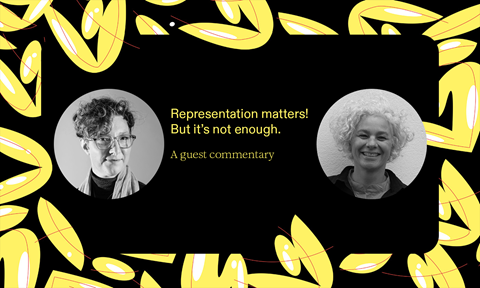Representation matters! But it’s not enough.

In recent years, an often lively discussion on diversity, inclusion, and anti-discrimination has taken place within the German media industry. Now the result can be seen on television and movie screens. And seeing is important here, because that’s what it’s all about: diversity must be visible. There is even content that centers its stories around characters from marginalized groups.
The once heated discussions have cooled down very quickly amid the current political and economic crisis in the industry, and critics have become more vocal, claiming that diversity restricts artistic freedom. Content that has taken up the banner of diversity is, in their view, too clichéd or is simply engaging in diversity-washing. Everyone wants diversity not to spoil content, and above all for it to seem normal, to be authentic!
A proverb often described as being of “African” origin states, “Until the lion learns how to write, every story will glorify the hunter.” The patriarchal narrative does just that, glorifying the hunters, justifying the hunt by objectifying the lions and expecting them to learn the hunters’ cultural technique of writing. This shows that even this critical proverb cannot break out of the oppressive system. All those who tell stories from the center of the dominant society do just that: they adopt the narrative of “us and them”. The patriarchal narrative describes the way that privileged people perceive marginalized people. It is an objectifying narrative that continually validates oppression. The patriarchal narrative is one that turns marginalized bodies into objects, even when those bodies are protagonists.
Hence, making characters from marginalized groups the subject of stories is a good start. This means recognizing and including their lifestyles and what they consider normal and actively incorporating these in the dramaturgy. Experiences of marginalization shape people’s lives and should therefore be taken into account — no matter what genre is being used. To avoid stereotypes, all characters should be more than just their marginalized identities. Author Nicolette Barischoff has said, “When a character with a disability doesn’t think about anything other than their disability, it shows me that the writers haven’t thought about anything else either. They can’t imagine living and working and playing and flirting and having sex in my body, even for a few paragraphs.”
A new kind of storytelling
All this ultimately leads to the question: What dramaturgy would be suitable for our times? What would be a narrative of the Other in which diversity does not stand for representation alone, but for a new kind of storytelling?
This new narrative questions the social order, insisting on nuanced characters and plot instead of settling for stereotypes and purely functional characters. Marginalized characters are no longer defined in relation to privileged ones, but are instead focused on in the narrative — collectively. After all, how much power does an individual have in a violent society that in its current form benefits only the few? This new narrative shatters the linear, causal structure that conforms to the normality of the dominant society. The common thread of the story has less to do with the characters and plot than with the audience.
How about a new dramaturgical model, a sisterhood journey? With “sisterhood” being understood here not in terms of gender, but as the antithesis of domination, dominance, and power. Sisterhood as a way of resisting structural mechanisms of oppression — as a narrative that acknowledges pain and celebrates differences. A dramaturgical work that incorporates authorship into its practice: What place in society am I telling my story from? What narratives does that point of view permit? What am I not seeing? Why am I the right person to tell this story? And a dramaturgical work that involves the audience in what it’s doing: Whom am I addressing? Whom am I excluding? What emotional journey do I wish to send the audience on? What questions do I wish to pose to the audience?
US author Ursula K. Le Guin considered the power of imagination to be by far the most useful tool available to humanity. Imagined alternatives to current, hierarchical ways of living are a form of protest that shakes up dominant forces in present-day society and thus poses a threat to all who benefit from the current system. Le Guin affirms that imagination is a power that exists apart from education and intellectual debate. It is therefore different from the intellectual concept of utopia. In it lies a real opportunity for revolution, because it produces its own tools instead of using the tools of those in power. The power of imagination held by marginalized bodies is a tool for resisting current conditions and dismantling the belief in existing dramaturgical models as the only, natural, universal option. “Imagining something that is true” is all this at once: a survival strategy, a form of protest, and a source of new narratives!
Büro für vielfältiges Erzählen
We founded the BvE in 2019. Our expertise lies at the intersection of dramaturgy and diversity, inclusion, and anti-discrimination. Our concern is with the “danger of a single story”, with overcoming stereotypical portrayals and exploring the potential of new narratives. We assist people in the media industry in becoming aware of their dramaturgical choices. In dialogue, we accompany the creative process of media professionals and help to sharpen their view of power structures in society, of the industry and of their own social perspective, in order to acknowledge the pain inflicted by society on marginalized and underrepresented groups in the name of artistic freedom and to develop an intersectional gaze that celebrates difference in the spirit of Audre Lorde.


